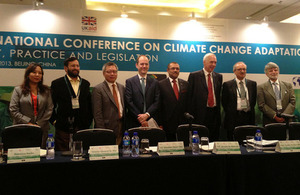UK, China and Switzerland collaborate on climate change project
On 1 July, the Adapting to Climate Change in China (ACCC) project brings policymakers, legislators and experts for conference in Beijing.

On 1 July, the Adapting to Climate Change in China (ACCC) project brings policymakers, legislators and experts for conference in Beijing.
On 1 July, the Adapting to Climate Change in China (ACCC) project brings together almost 150 policymakers, legislators and representatives of multilateral agencies from around the developing world for a landmark, three-day conference to explore how responses to climate change can and need to be an integral part of national development planning.
The world’s climate and weather patterns are changing and decision-makers at all levels must know how to best prepare for and respond to those impacts. They need to determine how communities can be protected from more frequent extreme events like flooding and how they can make the most of new opportunities, like planting different crops.
Although the global picture is clear, few countries and provinces have a precise assessment of how climate change will affect them and what they can do about it. ACCC, an innovative, four-year policy research initiative, investigated ways China could better understand these risks and response options.
The project was a joint Chinese-UK-Swiss effort, connecting British, Chinese and international experts in interdisciplinary teams to develop and share ways that China can make climate change adaptation a mainstreamed part of the development process. It showed how evidence and a clear understanding of risks and vulnerabilities are an essential foundation for any decision on what to do next.
As well as working at the national level, the project identified and analysed the most important climate change impacts in three pilot provinces - Inner Mongolia, Ningxia and Guangdong - and how they will interact with provincial development priorities.
Each community faces its own challenges adapting to climate change but every nation can learn from the experience of countries like China, with its complex terrain and wide range of economic and natural environments.
The conference gives the opportunity to decision-makers from more than 35 countries in the global South of getting a first-hand report on the results of the ACCC project and China’s growing expertise in adaptation policy. It also explores the opportunities for international and regional co-operation on the issue and how legislation can be used to deal with the impacts from climate change.
Professor Xu Yinlong, Professor at Chinese Academy of Agricultural Sciences and one of the world renowned experts in climate impacts in China, said:
This conference is a great chance to share with other countries the work that we’ve been doing with Chinese and British researchers over the past four years. We have certainly moved from having an “impacts only” focus to considering more of the social and economic issues of climate change.
The conference comes in a big week for climate change responses. At the same time in London, Britain is preparing to introduce its own National Adaptation Programme into Parliament. This sets out what government, businesses and society need to do to become more resilient to the effects of climate change.
Professor David MacKay, Fellow of the Royal Society (FRS), the Chief Scientific Advisor at the UK’s Department of Energy and Climate Change, said:
By combining our strengths and sharing scientific expertise, the United Kingdom and China together can continue to make a real difference on climate change. Sharing lessons from ACCC with other countries could help them better prepare for the future.
ACCC is a joint project between China’s National Development and Reform Commission, the Swiss Agency for Development & Cooperation and the UK Department for International Development and Department for Energy and Climate Change.